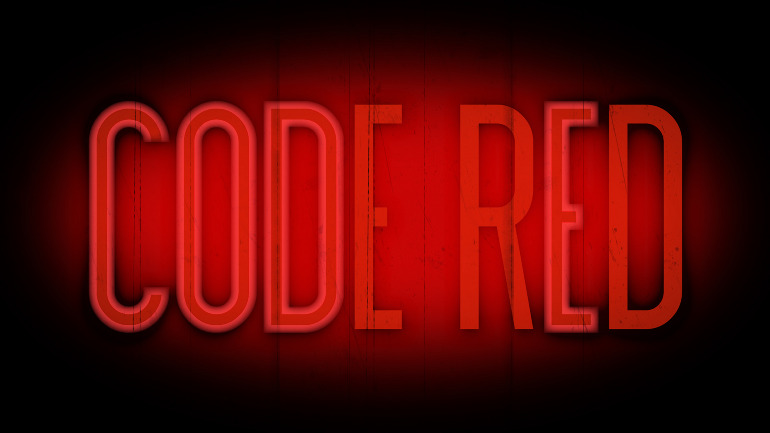Imagine that you told your employer about a harmful situation. You believe that the policy on this issue needs to be changed. You believe that you took the high road in calling the problem to management’s attention. I am proud of you for doing that!
What would happen next?
If you were a meteorologist working in Springfield, Illinois on station WICS-TV, your reward for being concerned, honest, and ethical is that you get fired.
The Situation
WICS’s owner – a large broadcasting group – wanted viewers to pay less attention to their electronic devices and more on their TV. To accomplish this, Sinclair Broadcasting told the weather announcers to use a certain graphic whenever there was any sort of weather system.
When I shout, “Code Red!” what do you think of?
I believe that something bad is about to happen.
The weather reporters on the station had to use a certain graphic for nearly every weather event, from a single rain shower or normal afternoon

How frequently does a normal weather day happen? I’d guess less than 10% of the year. So, think about how often this phrase “Code Red” would be ‘shouted’ at viewers.
Stephen Colbert reported, “The theory behind ‘Code Red’ is that it is exciting, it is grabbing, and more people will keep watching if you scare them…” but it is not informative.
Employees at WICS complained to deaf ears. However, the TV audience noticed, and the complaints poured in. Viewer complaints arrived as “thousands of” social media posts, letters to the editor, and via the station’s local talk shows.
This went on for months, but nothing changed. And then this happened…
According to The Washington Post, “Joe Crain, who has been a meteorologist at WICS in Springfield for the past 15 years, rose to fame last week after he slammed his station’s management for mandating the alarmist alerts without recognizing that ‘not all storms are created equal.’”
Showing concern and compassion, weatherman Joe Crain used his broadcast time to let viewers know the story of ‘Code Red.’ He noted that thousands of viewers who had complained, “As far as myself goes, I don’t take myself very seriously, but I do take my job seriously, and my responsibility to the public,” Mr. Crain told viewers. “We want you to know this is not us [the station]. It is a corporate initiative. Behind the scenes, many of us have tried to dissuade it for the last few months, to change it to something else less controversial to the viewers. You have a voice so keep those cards and letters coming.”
This on-air honesty became viral.
The Cost for Taking the High Road
Time Magazine said, “Businesses pulled their ads in support of Crain and to protest ‘Code Red’ as a needless alarm that persuaded people to stay home and away from restaurants and retail stores.”
Sinclair finally gave in and got rid of the code red requirement. They also got rid of Joe, one of the many who took the high road. In my opinion, he was singled out because his protest was the most visible. I believe Sinclair either needed a sacrificial lamb or someone to abuse and send the message: “Don’t do what Joe did!”
Sinclair, as of this moment, has not commented on why code red was changed nor why Joe was taken off the air.
About You
I want you to have a great career. I am committed to helping you navigate the turbulent waters of leadership.
You will find yourself in this dilemma many times in your professional and personal life. You see a harmful situation. You believe that something or someone needs to be changed. You believe that you SHOULD take the high road, get involved, and maybe even lead the change. That shows you are committed to taking the High Road®.
As you can see from Joe’s example, the cost could be high for this commitment. Here are four actions to take BEFORE you decide to take the onramp to the path less traveled. These help you make a wise decision.
Step 1: Explore why you feel heartburn about the issue. The issue in front of you is assailing your values and convictions. Think hard about your why because this internal insight will guide you.
The moment I saw Stephen Colbert’s coverage of Joe’s story, I knew I had to act. I am not rescuing him. I am citing his courage and highlighting his heroism.
Step 2: Make a quick list of ways that you can influence the situation. Consider both direct and indirect approaches. Consider others that might feel their convictions and values being assailed.
Notice that when social media got involved in ‘Code Red,’ change took place.
Step 3: Ask yourself “What if?” for the top two or three actions that you want to take. Consider the consequences, both the foreseeable and the unintended.
What if I get fired?
What if no one else cares?
What if I don’t say something?
What if my reputation gets trashed?
Step 4: Use a sounding board. It is easy to get caught up in your righteous indignation. Therefore, talk to someone who you know is a comprehensive thinker. A person who can ask the right questions, which help you decide.
I provide this service for many clients and colleagues.
Now armed and protected with good information you are prepared to act; this could be refrain from acting, too. But you are not done. Here are the final two steps.
Step 5: Now that you have a plan, implement it! Prepare for what is about to happen. Again, even NOT taking the high road has consequences – costs that you must pay.
Step 6: IF you took the high road: Celebrate yourself. You took the path less traveled because:
- You believe in the greater good.
- You have high standards.
- You are honest.
- You are ethical.
- You care.
- You practice compassion.
- You want to have impact and influence.
When you choose the high road path to success, you can sleep at night. You know you are connected to a purpose greater than yourself. You enhanced your brand because you showed integrity. You showed courage. You did what Joe Crain did.
I want you to know that you are my hero.
